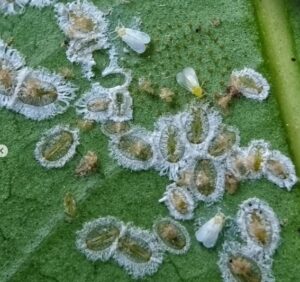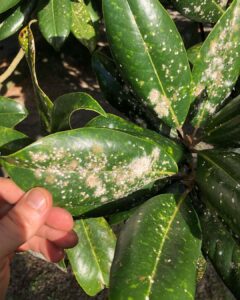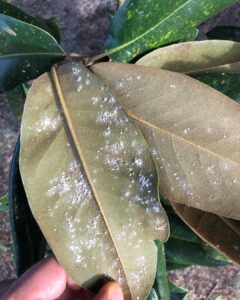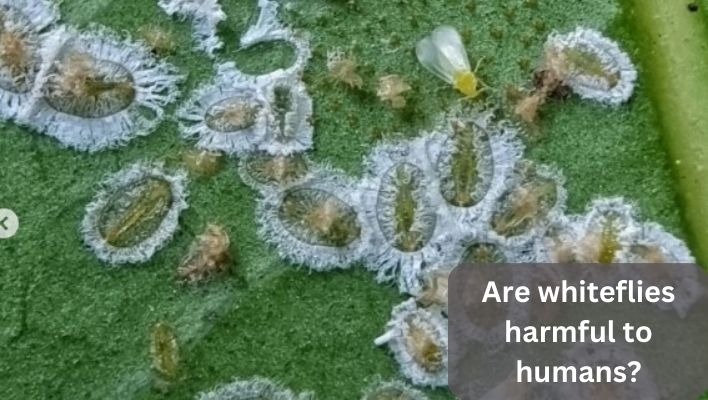Whiteflies are small, winged insects that belong to the Aleyrodidae family. They are commonly found in tropical and subtropical regions and are known for their ability to infest and damage various plants, including vegetables, fruits, and ornamental plants.
While whiteflies are primarily a concern for plants, many people wonder whether they pose a risk to humans. In this article, we’ll take a closer look at whiteflies and explore whether they threaten human health. By the end of this article, you should have a better understanding of whether or not whiteflies are harmful to humans.
What Are Whiteflies?
Whiteflies are small, winged insects that belong to the Aleyrodidae family. They are typically found on the undersides of plant leaves, where they feed on plant sap. Whiteflies are known for their distinctive white, powdery appearance caused by the waxy secretion they produce.
There are several different species of whiteflies, but some of the most common include the greenhouse whitefly (Trialeurodes vaporariorum) and the silverleaf whitefly (Bemisia tabaci). Both of these species can be found in many parts of the world and are known to cause damage to a wide range of plants.
Whiteflies are also known for their behavior, which includes swarming and flying in large numbers when disturbed. This behavior can make them particularly noticeable and bothersome to people close to infested plants.

Do Whiteflies Bite Humans?
While whiteflies are known to feed on plant sap, they do not typically bite humans. Whiteflies are not considered a direct threat to human health, as they do not transmit diseases to people or animals.
However, whiteflies can cause some discomfort to humans through their behavior. When disturbed, whiteflies will often swarm and fly in large numbers, which can be irritating or unpleasant for people in the area.
In addition, some people may experience skin irritation or allergic reactions if they come into contact with whitefly secretions or debris.
While whiteflies are not known to bite humans, they can still be a nuisance and may cause some minor health effects in certain individuals.
Are Whiteflies Harmful to Humans in Other Ways?
While whiteflies are not known to harm humans directly, they can indirectly affect human health through their impact on plants. Whiteflies are known to be carriers of various plant diseases, including viruses, bacteria, and fungi.
When they feed on an infected plant, they can pick up these pathogens and transmit them to other plants they feed on.
This can seriously affect farmers, gardeners, and others who rely on healthy plants for food or livelihoods. In addition, whiteflies’ spread of plant diseases can lead to increased pesticide use, negatively affecting human health and the environment.
While whiteflies may not directly threaten human health, their impact on plant health and disease transmission can seriously affect human well-being.

How Can I Protect Myself from Whiteflies?
Preventing whiteflies can be challenging, but several strategies can be effective. One approach is to use natural methods, such as introducing natural predators or parasites that feed on whiteflies. Ladybugs, lacewings, and parasitic wasps are all examples of natural enemies of whiteflies that can be introduced to an affected area.
Another approach is to use chemical methods, such as insecticidal soap or neem oil, which can kill whiteflies on contact. However, using these products carefully and according to the instructions is important, as they can harm beneficial insects and pollinators.
Finally, maintaining good plant hygiene can also help prevent whitefly infestations. Regularly removing any infected or damaged plant material and keeping plants well-watered and fertilized can help to reduce stress and make plants less susceptible to whitefly damage.
Overall, preventing whiteflies requires a combination of strategies and a good understanding of the risks and benefits of different methods. By using a variety of approaches and carefully considering the potential impacts, it’s possible to protect yourself and your plants from whiteflies effectively.
Whitefly Damage to Plants
Whiteflies damage plants by sucking the sap from the leaves, stems, and other parts of the plant. This can cause wilting, yellowing, stunted growth of the affected plant and premature leaf drop. In severe cases, whitefly infestations can cause plant death.
To recognize signs of whitefly infestation, look for small, white, moth-like insects that are often found on the undersides of leaves. You may also see a sticky substance called honeydew on the leaves and stems, excreted by the whiteflies as they feed. This honeydew can lead to the growth of a black, sooty mold that further harms the plant.

Whiteflies can have a significant impact on agriculture and the environment. In addition to directly damaging plants, they can also spread diseases that can reduce crop yields and quality. Using pesticides to control whiteflies can harm beneficial insects and pollinators, contaminate waterways, and harm other non-target organisms.
Therefore, it’s important to take proactive measures to prevent and control whitefly infestations, such as maintaining good plant hygiene and introducing natural predators or parasites that feed on whiteflies. By doing so, we can help protect both plants and the environment from the harmful effects of whiteflies.
Are whiteflies harmful to humans FAQs?
What are whiteflies, and why are they a concern for humans?
Whiteflies are small, flying insects that feed on the sap of plants. They are a concern for humans because they can transmit plant diseases and cause damage to crops and ornamental plants, which can impact food supplies and the economy.
Do whiteflies bite humans, and if so, what are the potential consequences?
Whiteflies do not typically bite humans, but their presence can be a nuisance. It may cause skin irritation or allergic reactions in some individuals if they come into contact with whitefly secretions or debris.
Are whiteflies harmful to humans in other ways besides biting?
Whiteflies can indirectly harm humans by spreading plant diseases, which can have serious consequences for farmers, gardeners, and others who rely on healthy plants for food or livelihoods. Additionally, using pesticides to control whiteflies can negatively affect human health and the environment.
How can I protect myself from whiteflies, and how effective are these methods?
Protecting yourself from whiteflies involves a combination of strategies, including introducing natural predators or parasites that feed on whiteflies, using insecticidal soap or neem oil, and maintaining good plant hygiene. These methods can be effective, but their effectiveness may vary depending on the severity of the infestation and the specific circumstances.
Can whiteflies be controlled without pesticides, and if so, how effective are these methods?
Yes, whiteflies can be controlled without pesticides through natural predators or parasites that feed on whiteflies and by maintaining good plant hygiene. These methods can be effective, but their effectiveness may vary depending on the severity of the infestation and the specific circumstances.
Conclusion
Whiteflies are small, flying insects that feed on the sap of plants and can cause damage to crops and ornamental plants. While they do not typically bite humans, their presence can be a nuisance. It may cause skin irritation or allergic reactions in some individuals if they come into contact with whitefly secretions or debris.
Whiteflies can also indirectly harm humans by spreading plant diseases, which can seriously affect farmers, gardeners, and others who rely on healthy plants for food or livelihoods. Fortunately, several strategies for preventing and controlling whitefly infestations include natural methods like introducing natural predators or parasites that feed on whiteflies and chemical methods like insecticidal soap or neem oil.
It’s important to use these methods carefully and according to instructions, as they can harm beneficial insects and pollinators. Protecting yourself from whiteflies requires a combination of approaches and a good understanding of different methods’ potential risks and benefits.
Taking proactive measures and being mindful of the potential consequences makes it possible to effectively control and prevent whiteflies and their impact on plants and humans.
